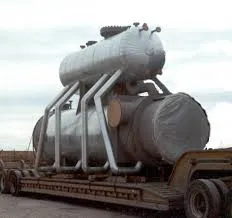Residential Hot Water Boilers for Efficient Home Heating Solutions
Understanding Residential Water Boilers A Comprehensive Overview
Water boilers are essential appliances in many residential settings, providing a reliable source of hot water for various domestic uses, including heating, cooking, and cleaning. As modern households continue to evolve, the demand for efficient, sustainable, and dependable water heating solutions rises. This article explores the different types of water boilers available for residential use, their benefits, and key factors to consider when choosing the right boiler for your home.
Types of Residential Water Boilers
1. Storage Water Heaters Storage water heaters, also known as tank water heaters, are among the most common types used in homes. These systems consist of a tank that stores a sizable amount of water, usually between 20 to 80 gallons. When hot water is required, it is drawn from the top of the tank while cold water enters the bottom to be heated. These devices are relatively inexpensive and easy to install, but they can be less energy-efficient due to standby heat loss.
2. Tankless Water Heaters Tankless water heaters operate differently than traditional storage heaters. Instead of storing hot water, they heat water on demand as it flows through the unit. This results in a continuous supply of hot water without the limitations of tank size. Tankless models are known for their energy efficiency and can help reduce monthly utility bills, although their upfront costs can be higher.
3. Heat Pump Water Heaters Heat pump water heaters utilize electricity to move heat instead of generating heat directly. They pull heat from the air or ground and transfer it to the water, making them highly efficient. This type of water heater is best suited for moderate climates and can provide significant energy savings over time.
4. Solar Water Heaters Harnessing the power of the sun, solar water heaters use solar collectors to capture sunlight and convert it into heat, which is then transferred to the water. While solar water heating systems require a higher initial investment and adequate sunlight exposure, they can lead to substantial energy savings and reduced carbon footprints over their lifespan.
Benefits of Residential Water Boilers
- Convenience and Comfort A reliable water boiler ensures that households have access to hot water whenever it is needed, enhancing daily comfort during baths, showers, and cleaning activities.
- Energy Efficiency Many modern water boilers are designed with energy efficiency in mind, helping users lower their energy bills while minimizing environmental impact
.water boiler for residential products

- Space-Saving Options With various models available, including compact and tankless designs, homeowners can find systems that fit within their space constraints without sacrificing performance.
- Increased Property Value Upgrading to a high-efficiency water boiler can enhance a home's overall value, making it more attractive to potential buyers.
Key Considerations When Choosing a Water Boiler
1. Energy Source Determine whether you prefer electric, gas, or alternative energy sources like solar or geothermal. This choice may depend on availability and cost in your area.
2. Capacity Needs Assess your household’s hot water needs based on the number of residents and peak usage times. This evaluation will guide your decision on the appropriate size and type of water boiler.
3. Energy Efficiency Rating Research the Energy Factor (EF) or Uniform Energy Factor (UEF) ratings, which provide insights into the efficiency of a water heater. Higher ratings mean more savings on energy bills.
4. Installation Costs Consider not only the purchase price but also installation costs, which can vary significantly based on the complexity of the installation.
5. Maintenance Requirements Understand the maintenance needs of different systems to ensure that you can keep your water boiler functioning optimally over time.
In conclusion, selecting the right water boiler for residential use involves a balance between personal needs, cost efficiency, and environmental impact. By considering the various options available, homeowners can make informed decisions that lead to long-term satisfaction and sustainability. Whether opting for a traditional tank heater or a modern, eco-friendly solution, the right choice can enhance comfort and convenience in any home.
-
Efficient Thermal Oil Boilers with AI Optimization | Superior PerformanceNewsAug.03,2025
-
High-Efficiency OEM Steam Boilers w/GPT-4-TurboNewsAug.02,2025
-
Advanced Electric Steam Boiler Manufacturers | GPT-4 Turbo AINewsAug.01,2025
-
Custom Steam Boilers Manufacturer | AI-Enhanced EfficiencyNewsJul.31,2025
-
Top Electric Steam Boiler Makers | AI-OptimizedNewsJul.31,2025
-
Top Electric Steam Boiler Manufacturers - High Efficiency SolutionsNewsJul.30,2025

